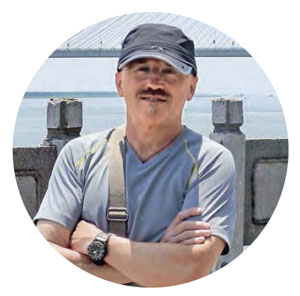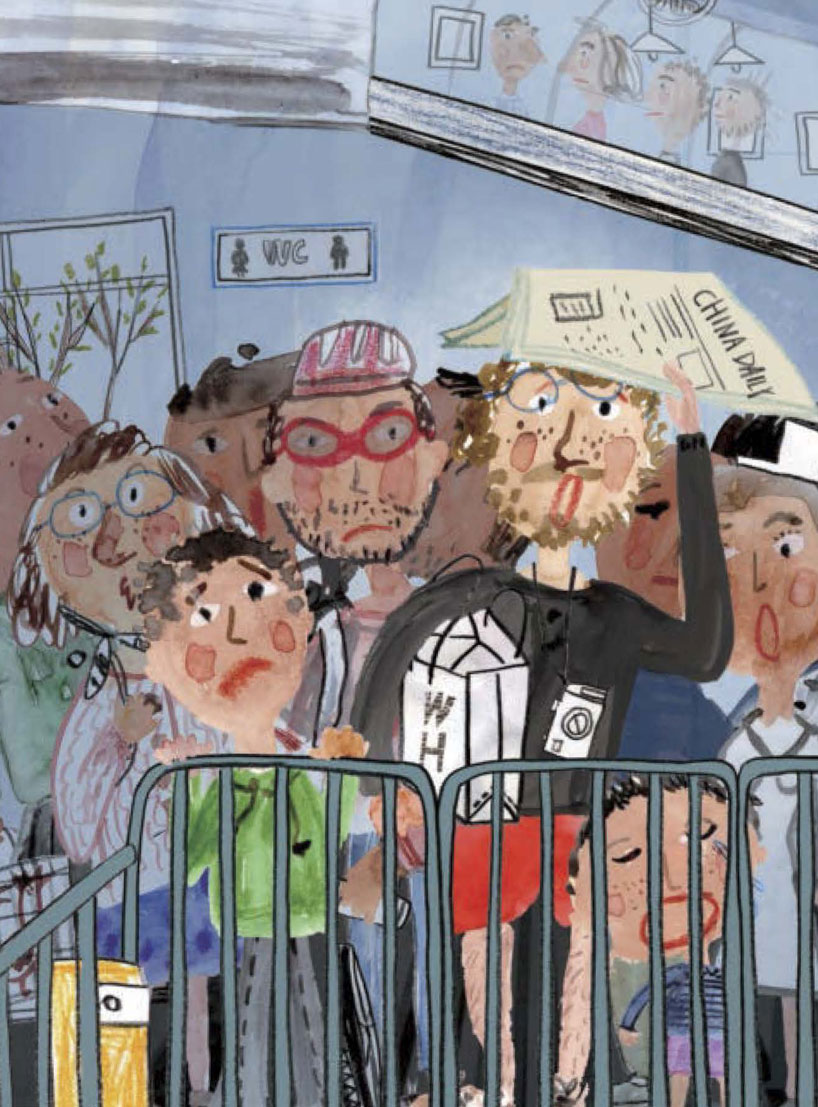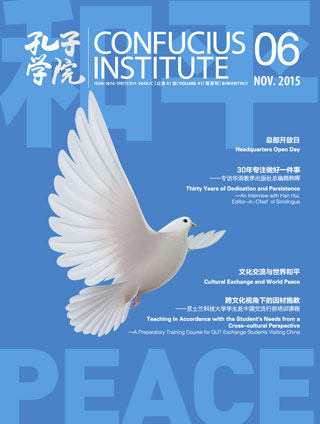
China in motion: a trip on public transport
Travel along China on public transport, by plane, train or bus, is each day a new adventure. China is a country in motion and with such huge cities with dense populations, you must figure out the best way to move the people. The north american teacher Joseph G. Krenitsky writes about his own experience.

In reality, today in China, people still use bicycles but the streets are now choked and congested with automobiles of all shapes and sizes.
This is an impression I have of modern China. I realize that my impression is in part influenced by the fact that I grew up in a small city in upstate New York called, Rome, New York.
My father, George, an educated man with a degree in Business from a prestigious noi1heast university, Wbarton School ofBusiness, chose to work in the copper factories of Rome, New York. At that time, in the United States, a factory job as a skilled laborer, paid a solid wage with good benefits, enough to allow my filther to support his family.
The factory was called Revere Copper and Brass, famous for their pots and pans. My family consisted of Dad and my Mont, Mary with their six children!
I did not grow up with a “big city” experience. I was not used to so many people crowded in one area living together in one place. I now realize for many Chinese, this is the only experience they have ever known. The places I have visited in China, for the most part have been big cities. Even smaller cities in China like Yich.ang, Jingzhou and Zhangzbou are very big compared to similar cities in the USA. My hometown is now Buffalo, New York, the second largest city in New York State and yet Buffalo has less than 300,000 people. So the experience is quite different.

People in motion
With such huge cities with dense populations, you must figure out the best way to move the people. In China, public transportation is interesting. You do not see as many bicycles on the streets anymore. The iconic photos and images of streets in China covered with huge swarms of bicycle riders are what we in the West have been exposed to in school. In reality, today in China, people still use bicycles but the streets are now choked and congested with automobiles of all shapes and sizes. In fact, I recently learned that a report shows more can were sold in China than in the USA for the year 2013.
Air travel has become more popular and accessible in China, it is no longer just a luxury but is now viewed as a necessary of the transportation system. Huge airports in China are filled with zhongguoren (Chinese people) waiting to board an aircraft. In the USA, getting on an airplane is very organized and done in an orderly manner. In China, most of the time, when the plane is ready for boarding, it is organized chaos. People do not board by rows or zone numbers but just push towards the gate (kou) to get on the plane. Over the past seven years that I have been fortunate enough to visit China I have noticed improvement. Chinese air travelers are becoming more courteous to one another and are learning airport etiquette.
The airport experience hall also changed and improved in China. Just look at the marvelous airports in Beijing. Hong Kong and even Wuhan. They are beautiful structures, engineering marvels of steel and glass, overbuilt in size and scope to accommodate future growth and expansion of the m 1ravel industry. These airports are spacious, inviting public places with all the comforts any air traveler might desire. Well done China!
A traditional and common method of moving people is the train (huoche). The trains of China have a long history going back to he Qing Dynasty when they were first introduced by the West. The steam engine or locomotive was a smoke belching beast of burden that pulled the steel serpent through the highlands and lowlands of China.
A book by one of my favorite travel authors Paul Theroux, is called “Riding the Iron Rooster”. This book was based on his experiences from a number of years ago. Mr. Theroux, I am happy to report to you that train travel has greatly improved since you rode the Iron Rooster! The first time I rode a public train was Spring 2013. I travelled with the help of my assistant, Wu Cheng Ming (Faye); from Wuhan to Jingzhou to visit and lecture at Yangtze University School of Law.
Getting from my university HUST to the train station was, as always, an interesting experience. While travelling the distance from HUST to the train station I had an opportunity to practice speaking my Mandarin with my driver. He was a patient pleasant man with a quick smile and did his best to keep the conversation going. He spoke almost no English. Thanks to my Chinese language classes at the Confucius Institute at the University of Buffalo, I was / able to tell him my name; where I was from; where I had been living in Wuhan (HUST); about my job as a teacher and a lawyer and where I was going to the City of Jingzhou and Yangtze University.
As usual, the driver praised me, telling me that my spoken Chinese was very good! I always find these compliments amusing because in reality, most Chinese people I meet have a much better understanding of English language than I do of the Chinese language. Nonetheless, it is part of Chinese culture to be humble and to praise the other person in the conversation. I graciously accept his compliments and thank him though I am not entirely sure my spoken Chinese is very good.
Suddenly, the conversation stops, the driver looks at me with concern, which station East or West? I have no idea. It never occurred to me that there might be two large train stations to choose from. I handed him my cell phone and he called my assistant Faye. We were at the wrong station.
After a short discussion, the driver heads back into the traffic choked and congested streets of Wuhan.
My friends in Wuhan now regularly complain about traffic. In fact, I have noticed over the past seven years that traffic has risen to the category of “second most popular complaint”.
So what is the first or number one complaint? The weather, the heat of Wuhan! Whenever I speak with Chinese friends about my trips and visits to Wuhan, their reaction is automatic, why Wuhan. it is so Hot!! I then must explain that I visit in the month of May and it is not so bad.
After my driver winds his way through the traffic he drops me off, with my luggage on the curb in front of the West Train Station. It is very crowded, very busy, like a beehive, buzzing with activity and it is raining quite bard. I felt for a moment abandoned by my driver, why couldn’t be wait until I was safely in the custody of my assistant Faye? Then I realize, he has work to do, fares to earn and he did get me to the right train station. Now how to find Faye in this busy public place? I try calling her cell but it goes directly to her voicemail. After a brief anxious moment of despair, a kind tap on the shoulder and I turn to meet Faye! I thanked her and praised her for her efforts, how did she find me so fast! I then realized, I was the only foreigner with huge luggage, in that area of the Train Station.
Next, we needed to buy tickets, store my big luggage until our train departs and find some food to eat for our lunch. She skillfully maneuvered through the crowds, tickets were bought, luggage stored and we were now going to find lunch.
Faye went outside to find a taxi, she knew of a KFC or Pizza Hut nearby. She assumed being a western law professor that would be best for me. When I told her I preferred Chinese food, she was pleasantly swprised and a little relieved She knew just the place, inside the train station to get delicious dumplings (jiaozi) and soup! She was right the food was delicious (hao chi, feichanghaochi). One thing you can always count on, local people in China know how to find the best local food ! In fact in my travels in China, one of my favorite things is to sample local foods and snacks! Faye gave me compliments on my use of chopsticks and my Putonghua! I was now well fed, relieved, relaxed and ready to board the train for Jingzhou.
We retrieved my big luggage and got in a long line to board the train. If I thought airport pushing in line was tough, this was a whole new challenge. We were in line, as soon as the gate (kou) opened the pushing began. We were packed tight like sardines in a can, I could move just baby steps forward At the gate there was security, papers, tickets and documents were necessary. Then we were forced through the security checkpoint like noodles pushed through a strainer. Once through we quickly made our way to our assigned train car.
I did not know what to expect next but I was pleasantly surprised. Once on board, we found a spot for my big luggage, my smaller bag went overhead, we found our seats and I took a long deep sigh of relief. The seats were clean and comfortable, the train car was clean and generally quiet, no litter or debris on the floors. I was not sitting next to a farmer from the country with a bamboo cage filled with chickens! The train ride from Wuhan to Jingzhou took us through the countryside of rural China. It was a quiet, peaceful ride. I enjoyed looking out at the farmers toiling behind their water buffaloes in their small fields and rice paddies. I imagined that their fathers and their father’s fathers for generations had probably done similar work. I hope someday, on a future visit, I will have an opportunity to visit rural China, away from the large urban centers. A place where the pace is slow and people are still in motion but at a different speed.
The return train ride from Jingzhou to Wuhan was also smooth, quiet and peaceful also right on schedule. Once off the train, things got interesting. Here was the dilemma, I needed to get from the train station to the bus for the airport shuttle. The distance was not far but too far to try to walk with my luggage.
Faye did her best to convince cab drivers to take us but they all refused. The distance was too short, the traffic was too bad and they could not make enough money on us. Faye did not give up, I saw her talking with some motor scooter operators. Next thing I know the older driver is frantically motioning to me to get on his scooter. I had a large duffel bag, at least 23 kg; a smaller red roll aboard, at least 18 to 20 kg; a black backpack and a plastic bag with gifts from Jingzhou. Faye had a small backpack and her purse. I took my big duffle bag and the driver put it in front of him. I hopped on with my backpack still on and held onto the driver with my right arm. In my left hand I had a death grip on my plastic bag filled with gifts. Faye hopped onto the other scooter with my red bag and we were off into the traffic choked streets of Wuhan. The scooter operators skillfully weaved their way through the traffic. I felt certain that I would lose the gift bag or worse yet, my wife would have to exercise her rights under my life insurance policy!
We made it! I was alive and my plastic bag filled with gifts did not break. China in Motion, wow, what an experience! Faye seemed pleased with her accomplishment of delivering me and my oversized luggage to the airport shuttle. We said our goodbyes, I thanked her for all her efforts and skillful problem solving. She turned, smiled, walked out into the crowded streets of Wuhan and she was gone.
The public bus ride
In Chinese the word for the public bus is ( gonggong qi che) one of my favorite words because it is fun to say! For a waiguoren, it is sort of like a tongue twister or nursery rhyme. In the Spring of 2013, I had my first ride on a public bus in China. In Wuhan, in the Wuchang district, there are many colleges and universities. There are many public buses on the busy Wuhan streets. It is amazing how the bus drivers make their way through the traffic. The bus itself is not too different compared to the public bus here back home. Maybe the bus in China is a little older with a little more wear and tear.
When I got on the bus, I told the driver where I needed to go, to HUST, the locals refer to the university as Huake. The driver motioned for me to stand near him as all of the seats were already taken. With each stop more passengers got on, and more and more until the bus was completely packed with people. I do not know what the capacity was listed but there is no doubt that if there was a limit to the number of passengers, it was exceeded. It would be impossible to squeeze one more person on the bus. I could not move, how would I be able to get off I wondered. Many of the riders were students who enthusiastically talked about their plans for the evening. Trying to look out the window, I looked for local landmarks and shops, I knew I was getting close to my stop and I began to get anxious.
Then, the driver turned his head, noticed me and motioned to get off. I was right across from the campus gate. That genuine small act of human kindness was greatly appreciated and never forgotten. I got off his bus, thanked him, he nodded and was on his way, moving his bus full of passengers closer to their homes or final destinations. China in motion, movement of the people by planes, trains and buses; each day a new experience. All of these events add to my Impressions of China, with hopes of many more new experiences still to come.
 Published in Confucius Institute Magazine
Published in Confucius Institute MagazineMagazine 41. Volume 6. November 2015.
View the PDF print edition
























No hay comentarios:
Publicar un comentario